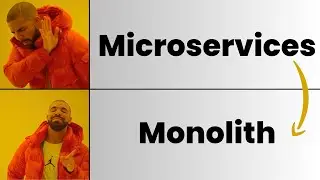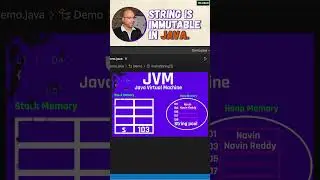#65 What is Interface in Java
Check out our courses:
Complete Java Developer Course Batch-3: https://go.telusko.com/completebatch3
Coupon: TELUSKO10 (10% Discount)
Enterprise Java Spring Microservices: https://go.telusko.com/enterpriseJava
Coupon: TELUSKO10 (10% Discount)
Master Java Spring Development : https://bit.ly/java-spring-cloud
Coupon: TELUSKO20 (20% Discount)
Udemy Courses:
Java:- https://bit.ly/JavaUdemyTelusko
Spring:- https://bit.ly/SpringUdemyTelusko
Java For Programmers:- https://bit.ly/javaProgrammers
For More Queries WhatsApp or Call on : +919008963671
website : https://courses.telusko.com/
In this lecture we will learn:
- What is an interface in java?
- Use of interface
- implements keyword in an interface
- Variables in an interface
#1
Interface:-
In an abstract class, we can have both abstract methods as well as normal or concrete methods.
- If your class has only abstract methods then instead of using class, you can simply use an interface in place of it.
- Interface is not any class.
- Every method in an interface is public and abstract by default.
- Even if you do not use two keywords (public and abstract) with methods then also it will not give an error in an interface. By default, it will consider all methods as public and abstract.
- We cannot instantiate an interface.
- Interface only shows the design and it does not provide any implementation.
- To provide an implementation of methods, you need to create a class and instantiate it also.
e.g,
interface A
{
methods()----
}
#2
implements keyword:-
To implement an interface, we use the keyword - implements.
- If you use the implements keyword with class, then it is compulsory to give an implementation of all the methods that are defined in an interface.
- If you do not give an implementation of all methods then it will make your class an abstract class by default.
- So, to make a concrete class, you have to give the implementation of all methods present in an interface.
e.g.,
class B implements A
{
methods() {
statement;
}
------
}
#3
Variables in an interface:-
- We can call the methods of an interface by creating an object of the class that implements an interface.
- We can also declare variables in an interface.
- All the variables in an interface are final and static by default.
- So, we first have to initialize the variables in an interface.
- As a variable is static in an interface, then you do not need to create an object for it. You can directly call the variable by using the interface name.
e.g., A.area; (here, area is a variable initialized in an interface)
- As the variable is final, you can not change the value of that variable after initializing it once.
-Interface does not have its own memory in the heap.
Github repo : https://github.com/navinreddy20/Javac...
Java:- https://bit.ly/JavaUdemyTelusko
Spring:- https://bit.ly/SpringUdemyTelusko
More Learning :
Java :- https://bit.ly/3x6rr0N
Python :- https://bit.ly/3GRc7JX
Django :- https://bit.ly/3MmoJK6
JavaScript :- https://bit.ly/3tiAlHo
Node JS :- https://bit.ly/3GT4liq
Rest Api :-https://bit.ly/3MjhZwt
Servlet :- https://bit.ly/3Q7eA7k
Spring Framework :- https://bit.ly/3xi7buh
Design Patterns in Java :- https://bit.ly/3MocXiq
Docker :- https://bit.ly/3xjWzLA
Blockchain Tutorial :- https://bit.ly/3NSbOkc
Corda Tutorial:- https://bit.ly/3thbUKa
Hyperledger Fabric :- https://bit.ly/38RZCRB
NoSQL Tutorial :- https://bit.ly/3aJpRuc
Mysql Tutorial :- https://bit.ly/3thpr4L
Data Structures using Java :- https://bit.ly/3MuJa7S
Git Tutorial :- https://bit.ly/3NXyCPu
Donation:
PayPal Id : navinreddy20
https://www.telusko.com

![[AMV] верно, я Кира..](https://images.videosashka.com/watch/8-3v0E_Axvw)





























